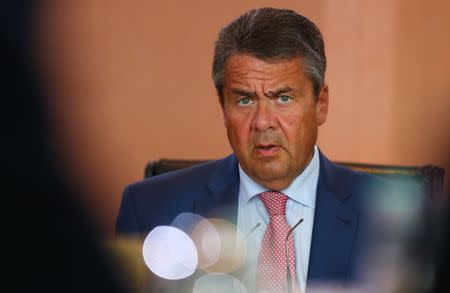Germany keen to avoid new 'ice age' in ties between Russia, West

WASHINGTON (Reuters) - Germany and Europe want to ensure that new U.S. sanctions against Russia do not lead to a new "ice age" in ties between Russia and the West, German Foreign Minister Sigmar Gabriel said on Tuesday. Gabriel said he spoke with U.S. Secretary of State Rex Tillerson about the sanctions in a meeting in Washington, adding that he was grateful that U.S. President Donald Trump had agreed to coordinate on further measures with U.S. allies. "We as Europeans have great concerns that this will have unintended consequences for Europe. We don't want to completely destroy our business relations with Russia, especially in the energy sector," Gabriel said. Trump this month approved new sanctions on Moscow for its 2014 annexation of Ukraine's Crimea peninsula and for what U.S. intelligence agencies say was its meddling in the U.S. presidential election, a charge Russia denies. Gabriel has criticised the United States for the move, saying the new punitive measures expose European companies involved in energy projects in Russia to fines for breaching U.S. law. Economy Minister Brigitte Zypries even urged the EU to retaliate against the United States if the new sanctions on Russia should end up penalising German firms. Gabriel said European leaders were concerned that the latest sanctions would not only have economic consequences, but could also "lead to a new ice age between Russia and the United States and the West." Despite European concerns about the sanctions, Gabriel insisted that Moscow must do its part to implement a fragile ceasefire agreement in place for eastern Ukraine, including the withdrawal of heavy weapons. "That would be a starting point for improved relations," Gabriel said. Kurt Volker, the newly appointed U.S. special representative for Ukraine, told broadcaster Deutsche Welle, that Washington would not forge any agreement with Moscow "over the heads of the Ukrainians or behind the backs of the Europeans." "The U.S. has made clear we fully support the Normandy process, and it's not our intention to become a part of it or to try to go over the top of it," Volker told Deutsche Welle. He acknowledged Russian concerns about Washington's decision to consider arming Ukraine in the conflict, but said it was "quite reasonable for Ukrainians to want to be better able to defend themselves." German Chancellor Angela Merkel and French President on Monday called for Russia and Ukraine to increase their efforts to implement the ceasefire agreement. The conflict between Ukrainian forces and Russian-backed separatists has claimed more than 10,000 lives since it erupted in 2014. Germany and France have tried to convince both sides to implement a peace deal agreed in Minsk in 2015 under the so-called Normandy process but with little success so far. Merkel told reporters on Tuesday that sanctions against Russia would be lifted when the situation in eastern Ukraine improved. (Reporting by Andrea Shalal; Editing by Hugh Lawson)

